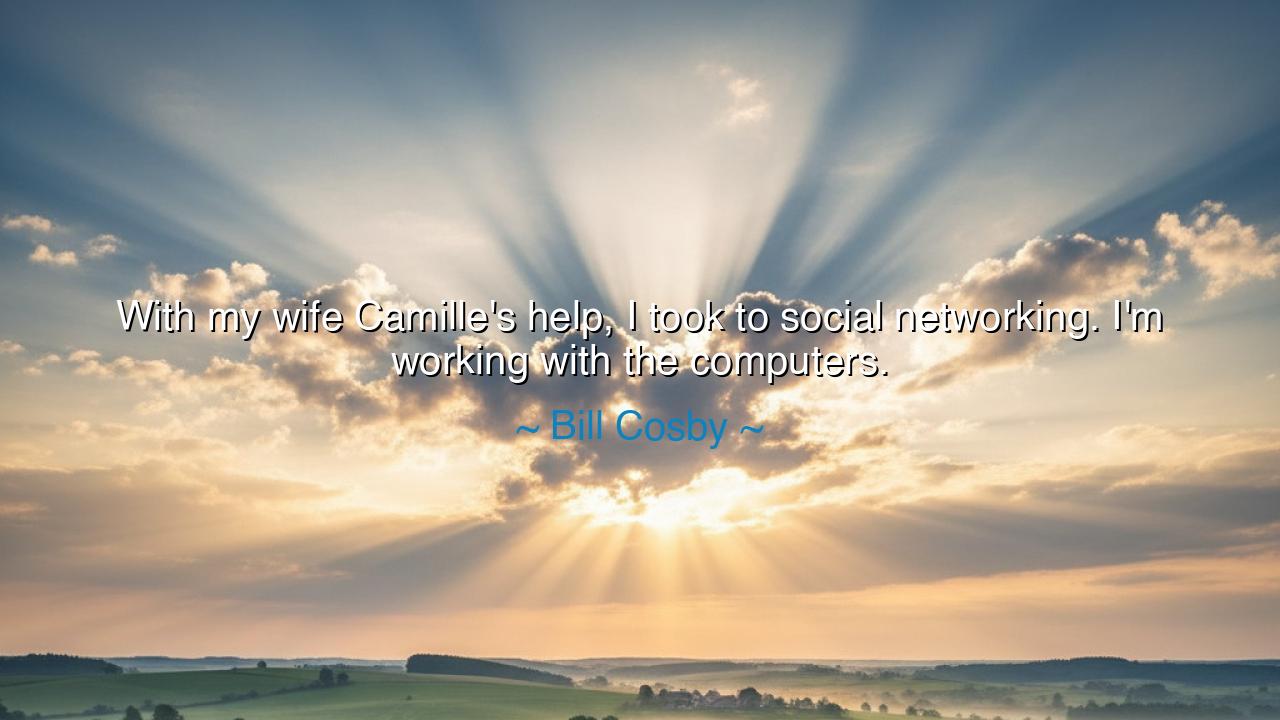
With my wife Camille's help, I took to social networking. I'm
With my wife Camille's help, I took to social networking. I'm working with the computers.






When Bill Cosby said, “With my wife Camille's help, I took to social networking. I'm working with the computers,” he spoke of more than a man learning to use machines; he spoke of adaptation, of humility, and of the eternal truth that one must continue to learn, even as the world changes beyond recognition. These words, simple on the surface, conceal a profound lesson about the bond between generations, the courage to grow, and the sacred art of remaining relevant in a shifting age. In them we hear not the pride of mastery, but the humility of one willing to be guided—proof that wisdom does not end with age, and that true strength often begins with admitting one’s need for help.
The age of computers and social networking has redefined human connection. Where once the storyteller spoke from a stage, now he speaks through screens that stretch across continents. For a man like Cosby—born into the world of radio, film, and live performance—this transformation represented a new frontier. Yet rather than resisting it, he allowed himself to learn. The mention of his wife, Camille, is crucial; it reveals that progress is not achieved in isolation but through relationship and trust. It is often those closest to us who help us cross the bridge between fear and understanding.
In a larger sense, Cosby’s journey mirrors that of countless souls who have faced the relentless tide of technological evolution. The transition from the analog to the digital world is not merely a technical shift—it is a test of humility and adaptability. It asks whether we are willing to unlearn what we know, to be students again after decades of being teachers. The philosopher who once wrote with quill must learn to type; the artist who once painted with brush must learn to draw with stylus. The spirit of creation demands no less—it calls upon every generation to meet the unknown with curiosity rather than pride.
This truth has echoed through all of human history. Consider Socrates, who once feared that the invention of writing would destroy memory and weaken wisdom. He believed that those who relied on written words would forget the living dialogue of the mind. Yet centuries later, writing became the vessel through which his very teachings survived. So too with every invention since—from the printing press to the telephone, from film to the Internet—each was met with skepticism, only to become the foundation of a new era of thought. Cosby’s statement, though modest, stands as a reflection of this eternal pattern: the wise eventually learn that resistance to change is resistance to growth.
But there is also tenderness in his words—a recognition that learning is not merely an act of intellect but of connection. His wife guiding him through the digital world is a symbol of how love and patience help bridge the gap between generations. It reminds us that in the vast network of human progress, no one advances alone. The old teach the young the wisdom of experience; the young teach the old the language of innovation. Thus, the wheel of knowledge turns, not through pride, but through shared humility.
In the deeper current of his message lies a universal truth: every era demands that we learn anew how to speak to one another. For Cosby, that meant learning the ways of social media; for others, it might mean learning empathy, new cultures, or the evolving moral codes of their time. To “work with the computers” is to accept one’s place in the living flow of history—to recognize that wisdom is not measured by what we already know, but by our willingness to keep learning.
So let these words be a lamp for all who feel overwhelmed by change. Whether you are old or young, seasoned or uncertain, remember that every generation must climb the same mountain of adaptation. What matters is not speed, but spirit—not mastery, but movement. The one who keeps learning never grows old; the one who resists learning withers before their time.
Final Lesson: True wisdom lies in the humility to learn and the courage to evolve.
Practical Actions: Seek help when the new confuses you. Let others teach you without shame, as Camille taught her husband. Approach every change—whether technological, emotional, or social—as a chance to deepen your understanding. For as long as you keep learning, you remain part of the living story of humankind, ever renewing, ever reaching forward into the light of discovery.






AAdministratorAdministrator
Welcome, honored guests. Please leave a comment, we will respond soon